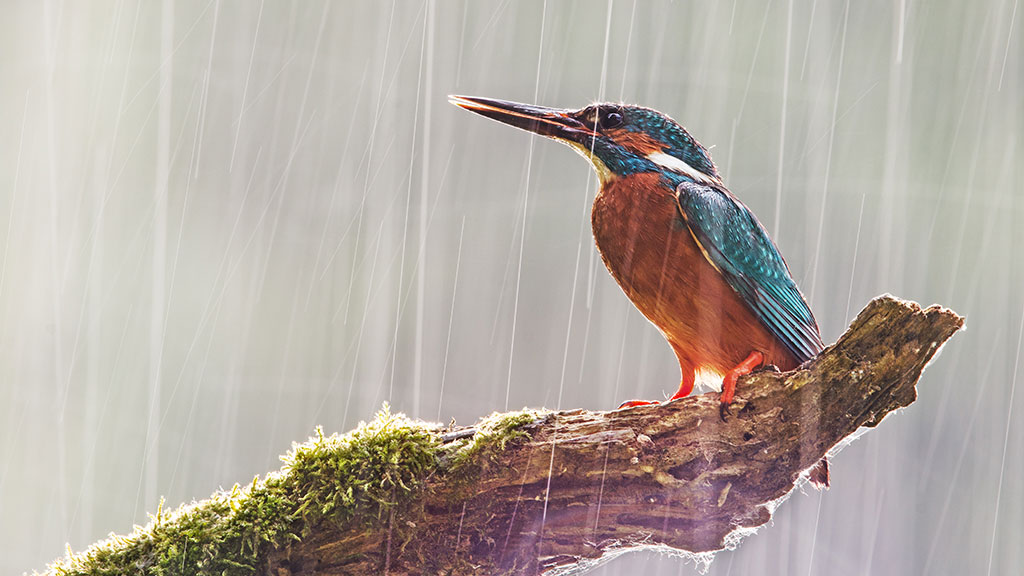The wetland visits helping treat anxiety and depression
Judith attended a WWT Blue Prescribing workshop at London Wetland Centre in 2022 as a way of helping to manage her anxiety and depression. She says she now tries to get out to a wetland as often as she can and thinks of it like taking her medicine.
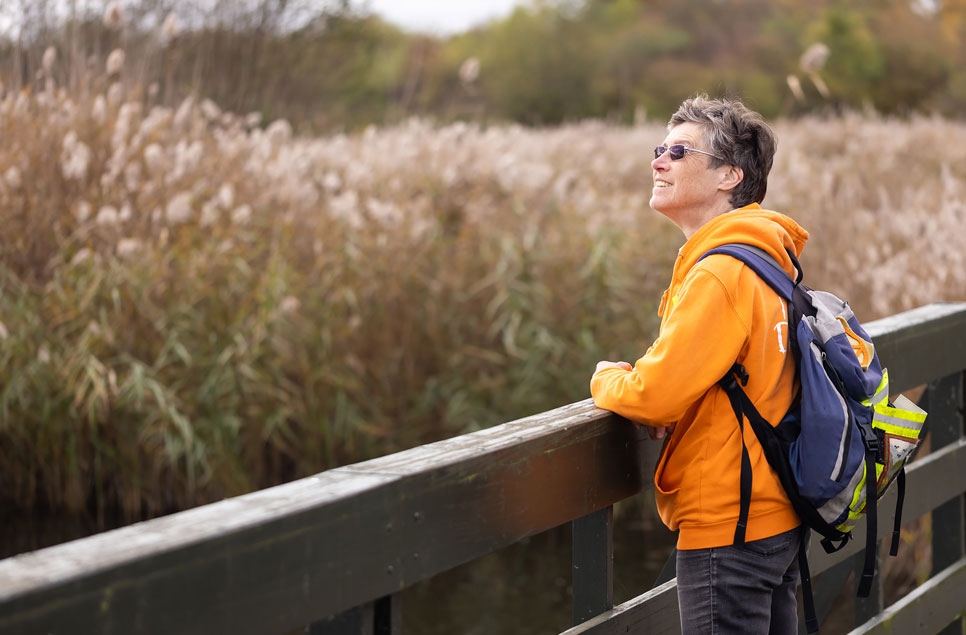
What made you decide to try the Blue Prescribing course?
From time to time I suffer from depression and anxiety. It tends to come in phases. Most of the time I live quite an active life. I run, swim, do yoga. But just sometimes I can feel depressed, like you feel like you don’t want to do anything. Sometimes all I want to do is just curl up and sleep, which is frustrating and not a pleasant place to be. So, I’m always looking for ways to help myself get out of those spirals. So I thought the Blue Prescribing course might help by giving me a bank of good memories to look back on, that would help me get out of the times when I’m feeling very down and depressed.
Was it like you expected?
When I came along to the first session, I thought it was going to be all about clearing reeds, digging ditches, working outside etc. But it turned out to be nothing like that. We were a small group of people with two facilitators. We very quickly got talking to each other and everyone was being very open and sharing their stories. Then the best part was when we went out into the wetland centre to walk around at our leisure - there was no pressure to go at any particular pace. We were also given binoculars to use in one of the hides.
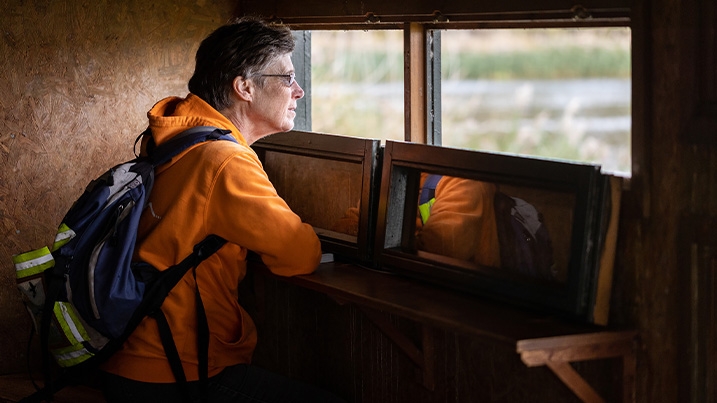
What do you remember particularly from that first visit?
What really surprised me was that although as a group we’d never met before, very quickly we were laughing together. I don’t know why exactly. I think it was just that we found such relief and relaxation being out in the open, being together, with no pressure to achieve or do anything. It was a really encouraging experience. I think that first day of laughing together is my strongest memory from the whole course.
What experience did you have already with wetlands and blue spaces before the course?
I was already a member of London Wetland Centre and used to come occasionally with my husband. But it was only when I started the course that I began to realise just how special it is here.
How does being around water help you?
Although I run and go out into the park and do exercise, that in itself wasn’t always that beneficial, especially when I was feeling depressed. I think in part because running had become quite a competitive sport for me. Whereas coming to the Wetland Centre is something quite different. There’s so much open space and no pressure on you to achieve anything. It just really helps clear my mind and helps me reset. You can just look out across the water and it is just water and reeds, plants and birds. Now I think of it as like taking medicine. I now try and make a point of coming perhaps once a week or fortnight to just allow myself to unwind.
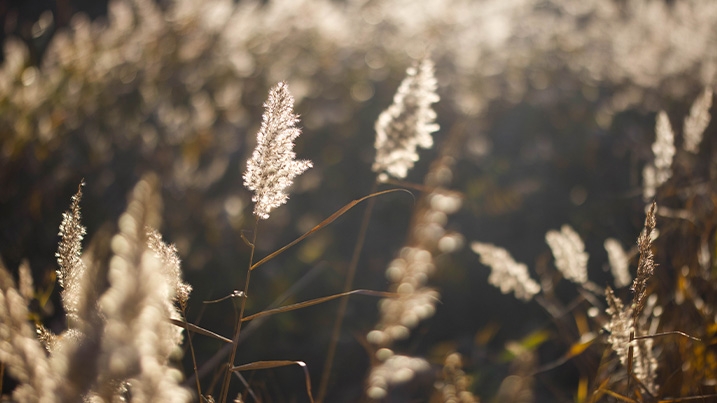
What tools have you taken away from the Blue Prescribing course to help you?
The first is the real importance of coming here. But I think I’ve also taken on board the idea that doing nothing or nothing that’s productive, isn’t wasted time. What coming to London Wetland Centre is teaching me is that wasting time by just walking with no purpose, just walking to be in the open air is actually very good for my wellbeing. And I think the other thing it’s taught me, is the importance of talking to and being with other people, especially when you’re depressed and feeling low.
How do you think you’ve benefited from coming on the course?
I initially signed up because I thought it would give me a bank of good memories to help me during the bad times. But what the Blue Prescribing course has taught me is how very valuable nature is as an antidote to a lot of the stresses we have in our lives. All too often we’re busy trying to prove ourselves and prove our worth. But you realise when you come here that wildlife just carries on regardless. It doesn’t measure targets and I think that’s a really good reminder for us. It’s really grounding, soothing and calming. When I come here I walk more slowly because there’s so much to see. You’re scanning the reedbeds and the surface of the water trying to see what birds there are, or looking up at the sky. Having that calm, empty space is really beneficial and you go away feeling quite light-hearted and refreshed.
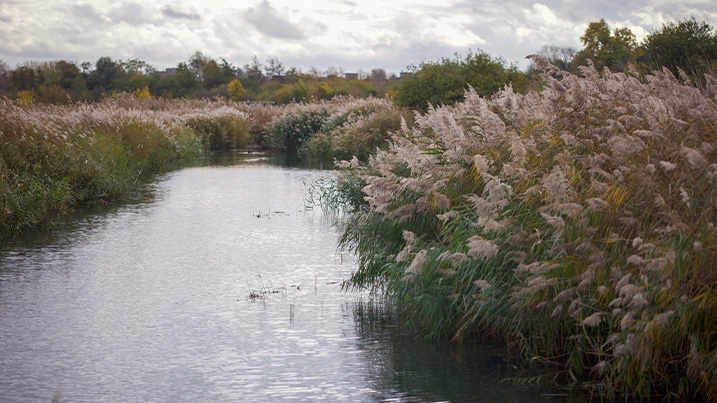
You also suffer from climate grief. How has the course helped you with that?
Climate grief is a growing stress and something that a lot of people feel, but can’t always articulate very clearly. A lot of my depression comes from that. I feel you can’t escape from it and it’s not going to go away. But in some ways that’s perhaps why I enjoy coming to the wetland centre, to come to a place where plants and wildlife are preserved and encouraged. When I look around here and think that twenty years ago, it was just a derelict site, it’s amazing to see how quickly nature can recover and that’s so encouraging.
What is it you enjoy about London Wetland Centre?
I think it’s the fact that it’s so unexpected. You’re a hundred metres away from the road, yet you feel you’re in the middle of nowhere. There’s so much wildlife here, not just the birds that migrate here, but also the little songbirds. I love watching the wildlife. Since the course, I’ve also brought my sister and husband here. And they were equally surprised that there’s somewhere like this in the middle of London.
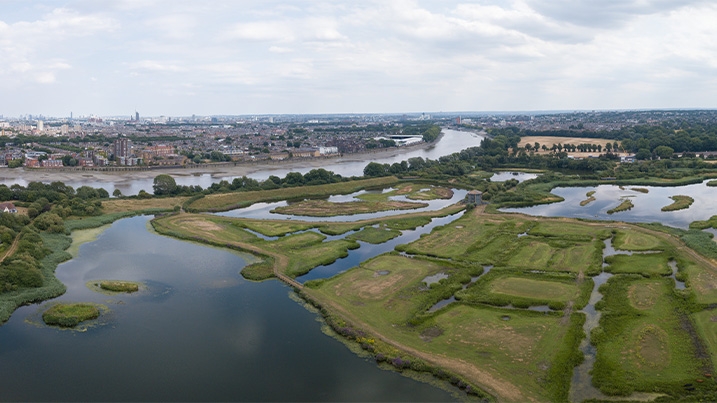
Do you have a favourite place?
Probably the bit that’s called the wild side. There’s a path through the reedbeds where you can hear the reeds moving in the wind and there’s a bridge over the water. It feels very remote and quite often there’s a swan or two there as well, which kind of adds to the joy of the place. I feel very relaxed and calm when I’m there. And even if I think about that place now, I can see it in my mind’s eye and I can feel that calmness returning. It’s a really good treasure trove and creates good memories.
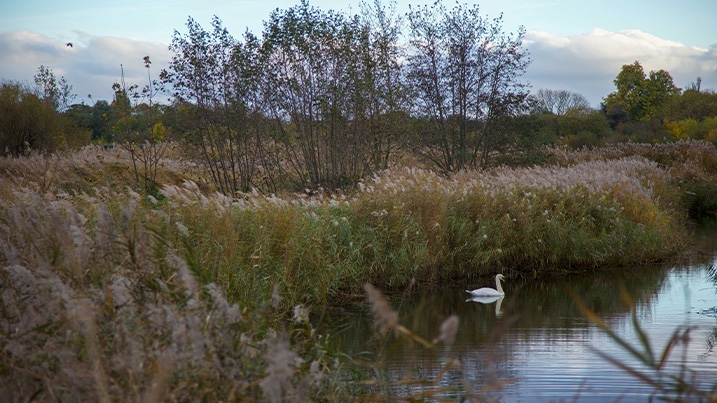
Did you have a favourite activity from the course?
Pond dipping. It was like going back to your childhood. We were bent over these pools and we had nets and scooped things out and we even found a stickleback. There’s something about going back to your childhood and having that freedom to play that I really appreciated. I think play is such an important part of being a human and as an adult, it’s easy to forget that. I also loved the time we were encouraged to go out and hug the trees and then we lay down on the grass and just looked up at the sky and the clouds. Doing this course gave you the freedom to do things you might not have done since you were a child.
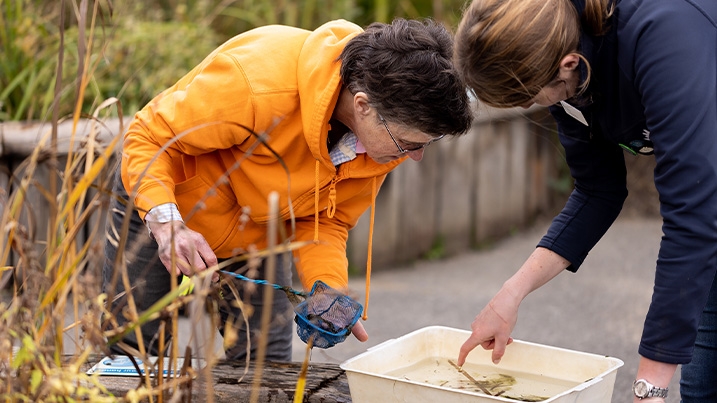
What’s the most surprising thing about yourself that you’ve learnt through the Blue Prescribing course?
I think it’s that you don’t have to work hard and do lots to achieve benefits. It’s about taking the time to slow down and just enjoy the world around me and not to expect things and just to enjoy what comes along. So I think it’s about being more open minded and generous with myself about what I expect from life and what I want to find.
How have things changed for you since you came on the course?
Since coming on the course I did have a spell of feeling depressed and anxious again. But because of the course, I knew I had to make a real effort to come here far more often. So now I’ve built it into my weekly programme and I’ve found that really beneficial. I think the other thing that has changed has been my relationship with nature. That it’s good to spend time just looking at what’s around you, not necessarily to see the big things, but to see the small things and realise they’re just as important. A couple of coots around a pond is just as exciting say as if I’d seen a bittern. And then if you have that openness, you’re ready to really enjoy the unexpected when it happens. Like the other week a kestrel just dropped down in front of me, caught a mouse and flew off with it and I then watched as it tore this animal to pieces. It was an amazing experience. And that’s an important lesson for life. If you don’t expect things, you’re not disappointed. But likewise it helps you to leave space to enjoy things when they do.
What would you say to someone who is suffering the same anxiety and depression that you were?
I’d really encourage them to take the time to come out and allow those worries to drift away and just wander and explore. Don’t go looking for some new, rare bird - just come and enjoy the calm. Looking out across the water and just becoming absorbed in the lives of the birds that you see, is such a soothing, calming medicine.
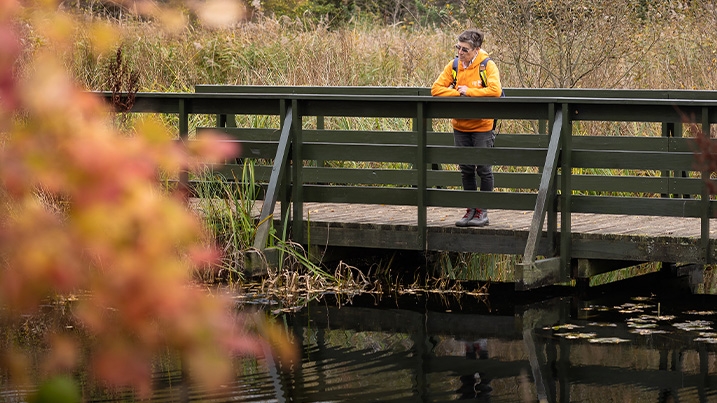
What would you say to someone who is considering coming on a Blue Prescribing course?
I’d say that although six weeks can initially feel like a big commitment, it’s really surprised me just how much you get out of that time. I know that when you’re unsure about something it’s sometimes hard to make the commitment. But doing this was really worth it.
How has the Blue Prescribing course helped you understand your mental health better?
It’s definitely given me lots to think about and reflect on. It showed me that my mental health can make me feel in a very deep, dark pit and very pressurised and constrained. But what I find at London Wetland Centre is the complete opposite. So the course has shown me what my depression is like and how somewhere like this open space can really help.
If you're looking for support with your mental health we are currently offering our Blue Prescribing programmes at our wetland sites at WWT London and WWT Steart.
Find out more
